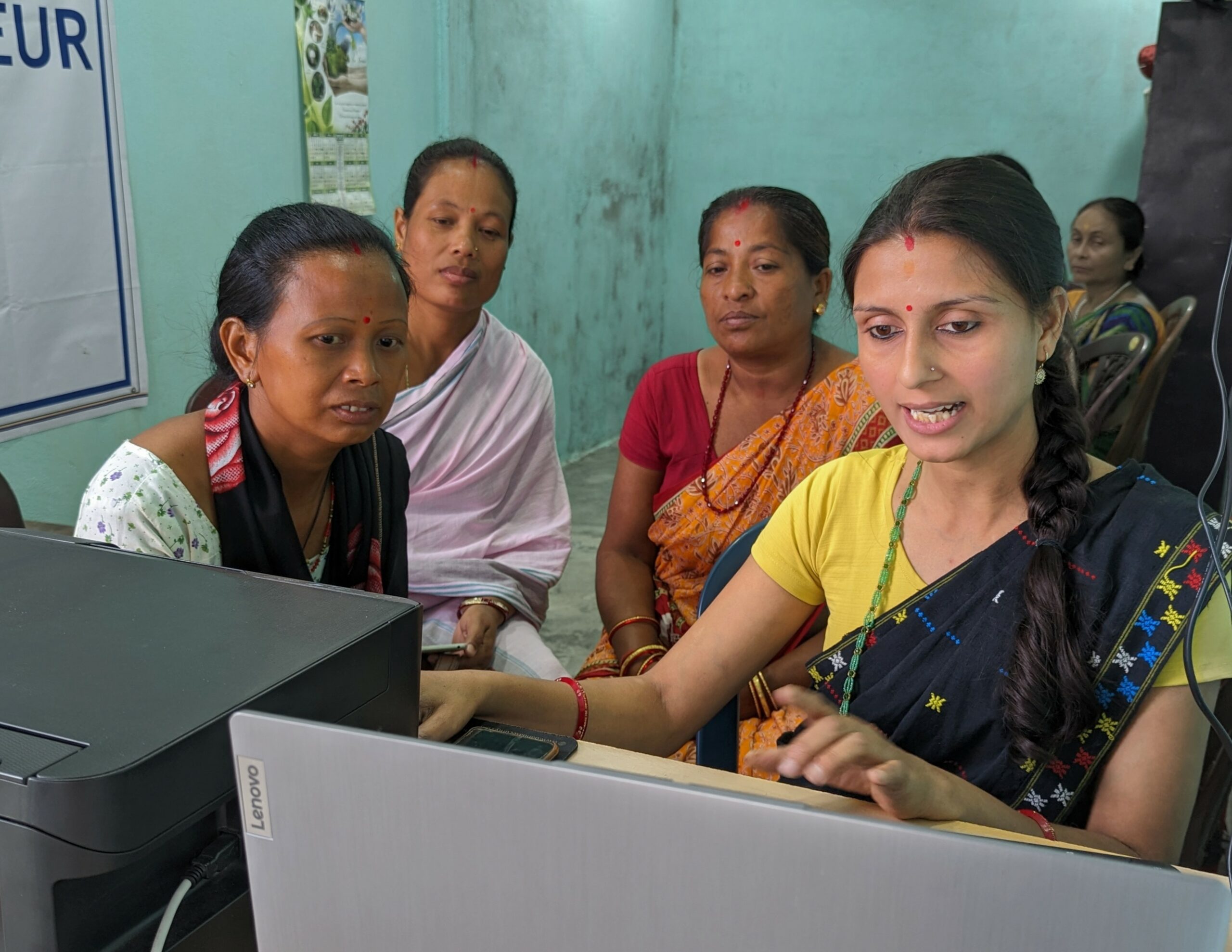With India’s steadfast development, many cultural restrictions imposed on women have weakened over the years, and society is still in the stage of learning and unlearning. Most women today are aware of their freedom and are still in the fight to smash the patriarchy. The united voices have spoken volumes in the form of Women’s rights, Feminism and Women empowerment groups. Many women today are educated and hold honourable positions across the globe.
“One day my mentor introduced me to the most fascinating thing ever – Google. Google was the powerhouse of knowledge and everything that the human brain could think of was readily available on Google. But before we actually delved into learning more about it, my mentor told me that anything and everything available on the internet had its benefits and disadvantages and that we must always be consciously aware of these disadvantages that come our way.”
Sabita, Bharatpur in Rajasthan
However, this is not the case for women hailing from economically weaker households, they are at a disadvantage as it is difficult for women in those sections to even afford basic education, illiteracy over the decades has caused many women from the economically weaker sections to be confined under the rule of patriarchy and be financially dependent on their spouses.
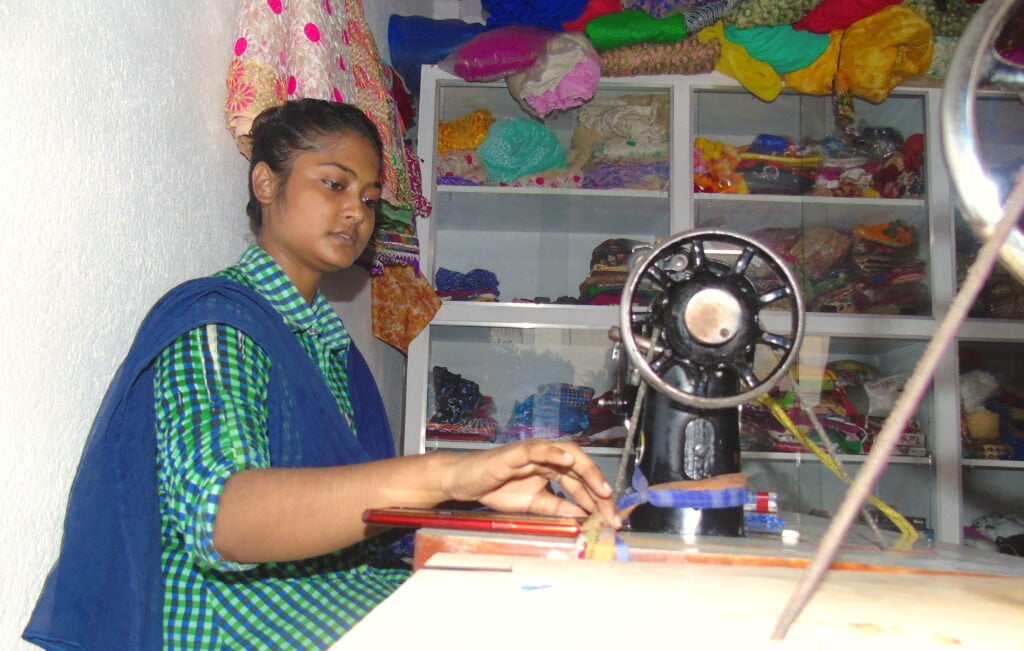
Few women who did venture out to be financially independent were met with unemployment paired with social stigmas, thus to be financially independent without the shackles of oppression and subordination, entrepreneurship seemed like a leading light, economic statuses of these women still persisted as a major barrier to their dreams of being independent. Banks couldn’t sanction loans in their names as the collateral submitted was mostly registered under their spouses’ names. This led to the formation of Self-Help Groups (SHGs).
The rise of self-help groups
Self-help groups (SHGs) are small voluntary all-women groups formed within a related community or in parts of villages consisting of about 10-20 local women. SHGs mostly focus on making its members self-reliant through financial independence thus it not only increases their income but also improves their well-being and status in society. With the introduction of SHGs women’s unemployment problems were also addressed. This initiative has sensitised women about their importance and potential thus empowering them. Self-Help Groups supporting women entrepreneurs with micro-loans have created an environment for women to practise agency and decision-making skills.
Also Read: Does Digitalisation Support Women In Mobilising Intellectually and Socially?
India saw the beginning of its first SHG movement in 1980 when a number of non-governmental organisations mobilised economically backward communities from rural areas, these organisations introduced them to formal routes to gain financial and social support. The programme gained more strength when the National Bank for Agriculture and Rural Development worked with a small number of such groups to link them to banks which later came to be known as the ‘Self-Help Group Bank Linkage Programme’. This initiative connected its all-women members, some of whom never had an account under their name, to formal financial services in a sustainable manner.
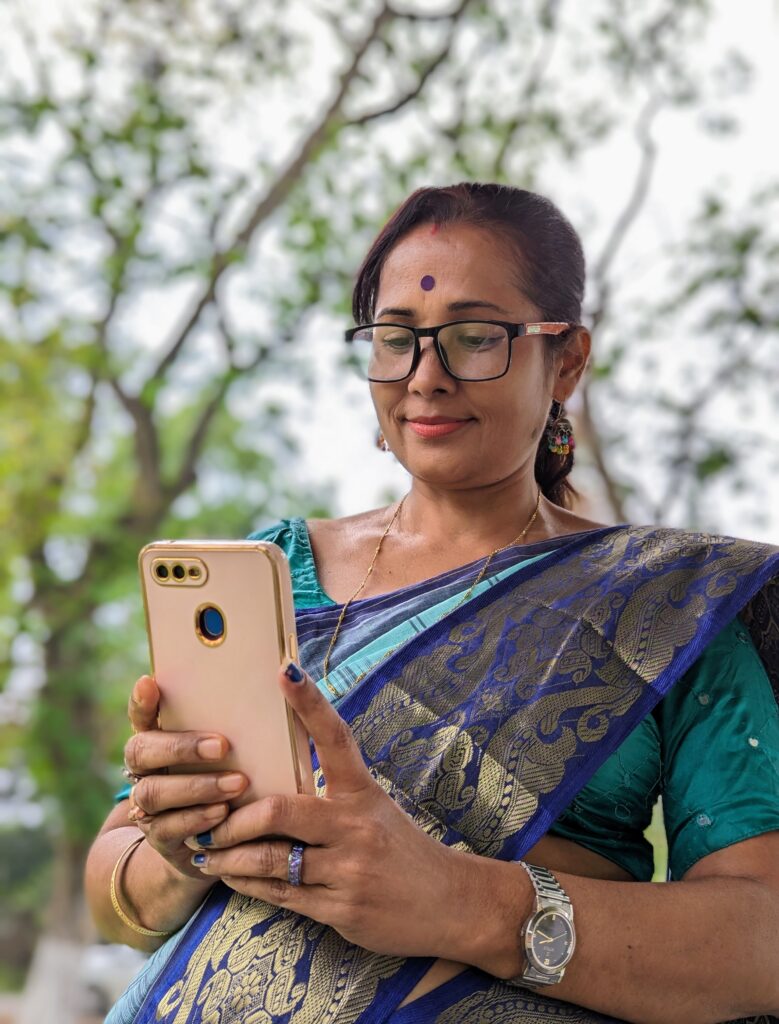
These groups started out with informal connections, however today it is fostered and funded by formal links. Prime Minister Narendra Modi in the year 2021 released Rs 1,625 crores to more than 4 lakh Self Help groups. In addition to this lump sum, he also released Rs 25 crore as an initial fund for over 7,500 SHG members who are associated with the PM Formalisation of Micro Food Processing Enterprises Scheme (PMFME) which is by the Ministry of Food Processing Industries.
DEF has been trying to bridge the digital gap between marginalised communities and the fast-growing technologically advanced society. Being technologically challenged today directly translates into ‘being unfit’ for employment. This is where initiatives like DigiGyan, Digital Didi etc by DEF have impacted the lives of young minds along its way.
Over the years, SHGs have gained recognition and have impacted regional imbalances with their provision of micro-loans. A study conducted on the influence of SHGs on their livelihood (consumption, expenditure and saving patterns) by the Ministry of rural development revealed that 10% of women aided by an SHG were more likely to save consistently, which has thus reflected in economic empowerment.
No mortgage, low-interest micro-loans are the core of SHGs and an important tool of empowerment to women from the economically weaker sections of society. Even though SHG was initiated aiming for financial independence, its infiltration into society has brought sisterhood, status improvement, family development etc. SHGs are evolving with time, they are spreading their wings and empowering more and more women each year, and the role of non-profit organisations like DEF (Digital Empowerment Foundation) is huge in this process and they have contributed immensely to this sector.
Looking at the Digital Empowerment Foundation (DEF)
DEF is a Delhi-based digital non-profit organisation registered under the Indian Societies Registration Act, of 1860, which has a primary focus to empower people digitally. They constantly are an inevitable part of information empowerment, the organisation aims to make technology easily accessible to the masses, and they tend to focus on empowering the youth, women, elderly and the disabled by making technology easily available to them in the form of media literacy, functional digital literacy, micro and nano-business, digital upskilling in terms of agriculture, health, entrepreneurship and livelihood.
“It was not until I joined the DEF program while studying for my final year in college that I was aware of using it for learning purposes as well. On the internet, I found boundless knowledge which helped me in studying during the final year. Out of curiosity I also gained some knowledge on the concept and the process of starting my own business.”
Subhashini, Barabanki in Uttar Pradesh
DEF has over 2,000 Community Information Resource Centers across 24 states and 135 districts through which they have been actively empowering local communities digitally for the last 20 years.
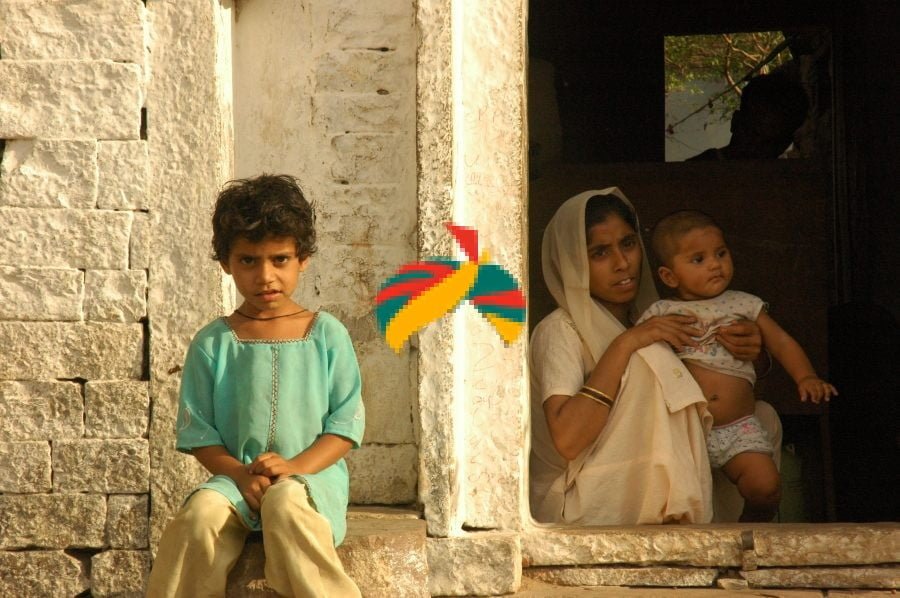
DEF has positively impacted the lives of more than 30 million people who are identified to be from the below-poverty line sector, artisans, women, youth, the disabled and the elderly. DEF was co-founded by Osama Manzar and Shaifali Chikermane with a vision to end information poverty and social backwardness by bringing about a digital revolution.
Powerful initiatives by DEF
“One day my mentor introduced me to the most fascinating thing ever – Google. Google was the powerhouse of knowledge and everything that the human brain could think of was readily available on Google. But before we actually delved into learning more about it, my mentor told me that anything and everything available on the internet had its benefits and disadvantages and that we must always be consciously aware of these disadvantages that come our way,” says Sabita from Bharatpur in Rajasthan.
Also Read: Women And Self-Help Groups: A Sustainable Model Of Rehabilitation And Empowerment
DEF has been trying to bridge the digital gap between marginalised communities and the fast-growing technologically advanced society. Being technologically challenged today directly translates into ‘being unfit’ for employment. This is where initiatives like DigiGyan (This programme worked towards digitalising classrooms in government schools, thus in a way bridging the digital divide amongst students of different socio-economic backgrounds), Digital Didi (This programme was launched with the perspective of enabling and empowering 50000 girls across 135 districts with digital skilling and hygiene practices.) etc by DEF have impacted the lives of young minds along its way.
“It was not until I joined the DEF program while studying for my final year in college that I was aware of using it for learning purposes as well. On the internet, I found boundless knowledge which helped me in studying during the final year. Out of curiosity I also gained some knowledge on the concept and the process of starting my own business,” says Subhashini from Barabanki, Uttar Pradesh.
SoochnaPreneur is a rural entrepreneurship-based project targeted at empowering the youth in Indian villages to sustain their livelihood by giving them access and information to government entitlements. This initiative extends to supporting, enhancing and strengthening the abilities of grassroots communities to access and aid information and entitlements in critical areas of education, health, financial and social inclusion.
Another initiative that helped digitalise Indian villages is the Smartpur programme. This has helped to digitally advance rural spaces, thus connecting the community more through technology at any time of the day. “With the help of DEF I was able to revive things of the past and modernise it to my will. Kirana stores are a thing of the past now as COVID has made every transaction go online. I have been able to modernise this by giving out my store’s contact info and offering doorstep services for any and every need from 6 in the morning till 12 at night,” says Puja from Guna in Madhya Pradesh.
“Having DEF’s support at every step provided me with the information and the process of what product to make, how to make and the current market demand. With this knowledge came the self-confidence that I had been looking for before. Self-confidence, to me, is one of the pillars that support a healthy and successful life,” says Komal from Bharatpur in Rajasthan.
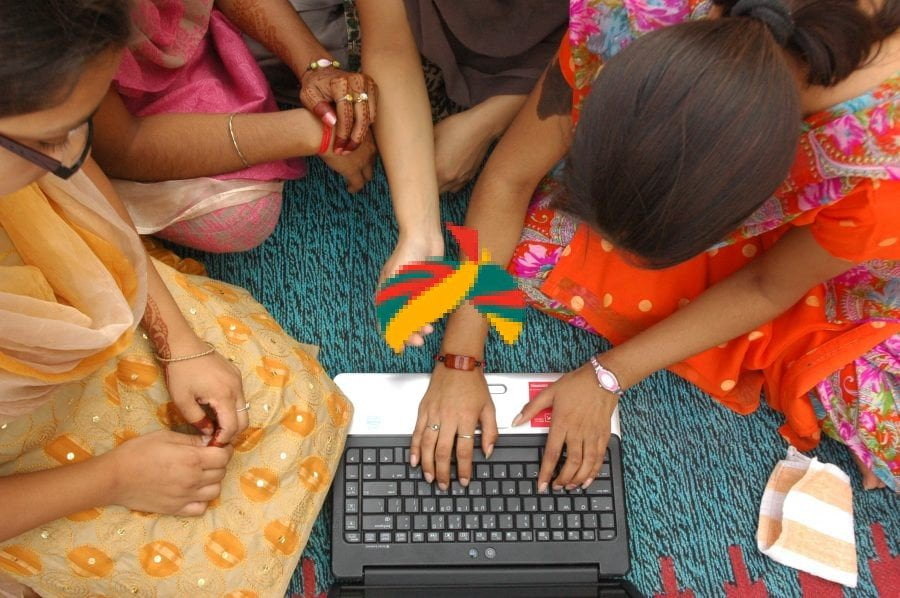
Another initiative that helped digitalise Indian villages is the Smartpur programme. This has helped to digitally advance rural spaces, thus connecting the community more through technology at any time of the day. “With the help of DEF I was able to revive things of the past and modernise it to my will. Kirana stores are a thing of the past now as COVID has made every transaction go online. I have been able to modernise this by giving out my store’s contact info and offering doorstep services for any and every need from 6 in the morning till 12 at night,” says Puja from Guna in Madhya Pradesh.
Also Read: Kudumbashree: Leveraging The Transformative Potential Of Self-Help Groups For Women
DEF thus have been trying to bridge the digital gap between the marginalised and the fast-paced modern society for the last 20 years. Empowering the marginalised through digital knowledge has reduced the gap between rural and urban spaces. Rural spaces are developing today with digitalisation, the marginalised are not only connected with the Indian urban but are also connected to the world through technology.
Education will not be filtered through patriarchal norms as it reaches women rather they will have the agency to learn and unlearn at their disposal. As Poonam Verma said “Today, the women I work with, are not the ‘conventional women’ society thinks they are. Instead, they are women entrepreneurs who use YouTube to teach themselves to sew and sell their products for money. They are entrepreneurs who stand up for themselves and are equally motivated to pass this knowledge to their future generations”.
This article is part of the A-code partnership between FII and DEF. DEF is active on Facebook, Twitter, YouTube, LinkedIn, Instagram and you can check their website for more details.
About the author(s)
Elizabeth has completed her Master's in English at Manipal University. She loves to write and is hopeful about bringing a change through her writings and when exhausted by it she often indulges in films, music and tv shows.
